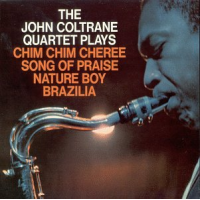Home » Jazz Articles » Album Review » Archie Shepp: Four for Trane
Archie Shepp: Four for Trane
One listen to this album reveals the debt Shepp owes not only to Coltrane but to Mingus. The group sound here, although Shepp’s ensemble is smaller, recalls nothing more than Mingus’ Impulse recordings The Black Saint and the Sinner Lady and Mingus Mingus Mingus Mingus Mingus. Shepp does it with a sextet that achieves a fuller sound by containing four horns and no piano: Shepp’s tenor is combined with John Tchicai’s alto, plus the brass of Alan (The Other) Shorter on trumpet and the impeccable Roswell Rudd on trombone. Reggie Workman plays bass and the late, great, criminally underrated Charles Moffett mans the drums.
Shepp did the arranging. At the time his work received mixed reviews, for some of the propulsive dynamism of the original Coltrane quartet recordings of these songs ("Syeeda’s Song Flute," "Cousin Mary," and "Naima" from Giant Steps and "Mr. Syms" from Coltrane Plays the Blues ) is necessarily lost as Shepp transforms the heads that were originally performed by Coltrane’s sax alone into vehicles for four horns. Indeed, if one turns immediately from Giant Steps to Four for Trane, the effect can be jarring. Yet it is only a drop-off in quality if one expects simply to hear Archie Shepp playing Coltrane tunes (an experience that can be had on innumerable lesser Shepp records). Dropping expections and taking these arrangements on their own terms, they succeed beautifully, not in restating Coltrane’s work on these pieces, but making them something new. Check out especially the strikingly imaginative alternating-note head arrangement on "Naima." Four for Trane illustrates the ability of Coltrane as a composer. While Coltrane’s songs were widely thought of as empty platforms for blowing, Shepp shows here that they have the depth to stand a different treatment.
The playing is fine. Shepp’s soloing is typical for the period; whoever first called him a sheep in wolf’s clothing should get an award for precision of statement. His tone is tinged with the multiphonic "scream," but his choices always tend toward lyrical statements. When the tension between these two elements is balanced, as it is here, he is a delight to hear. Wayne’s brother, heard most extensively on "Mr. Syms" and "Cousin Mary," plays a trumpet of similar emotional intensity that to my ears recalls no one’s trumpet work more strongly than that of Mr. Ornette Coleman. Were it not that this album precedes by a year any recorded appearance of the Coleman trumpet, I’d go so far as to say that Shorter actually betrays Ornette’s influence. Perhaps it’s the other way around, or that both Shorter and Coleman take Don Cherry as their primary trumpet exemplar. Rudd, the trombonist, is astonishing. He is a good match for Shepp (as they both obviously knew; he appears on a good many more Shepp albums of the time) in that the playing of both betrays an awareness of the entire jazz tradition. Finally, Rudd is probably the world’s only Dixieland / swing / free jazz trombonist, and virtually any recording with him on it is worth hearing.
Personnel
Archie Shepp
saxophone, tenorAlbum information
Title: Four for Trane | Year Released: 1997 | Record Label: Impulse!
Tags
PREVIOUS / NEXT
Support All About Jazz
 All About Jazz has been a pillar of jazz since 1995, championing it as an art form and, more importantly, supporting the musicians who make it. Our enduring commitment has made "AAJ" one of the most culturally important websites of its kind, read by hundreds of thousands of fans, musicians and industry figures every month.
All About Jazz has been a pillar of jazz since 1995, championing it as an art form and, more importantly, supporting the musicians who make it. Our enduring commitment has made "AAJ" one of the most culturally important websites of its kind, read by hundreds of thousands of fans, musicians and industry figures every month.





















